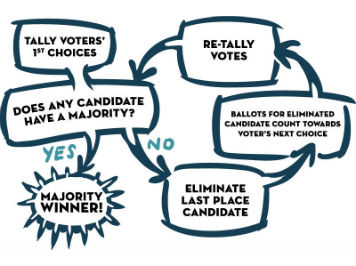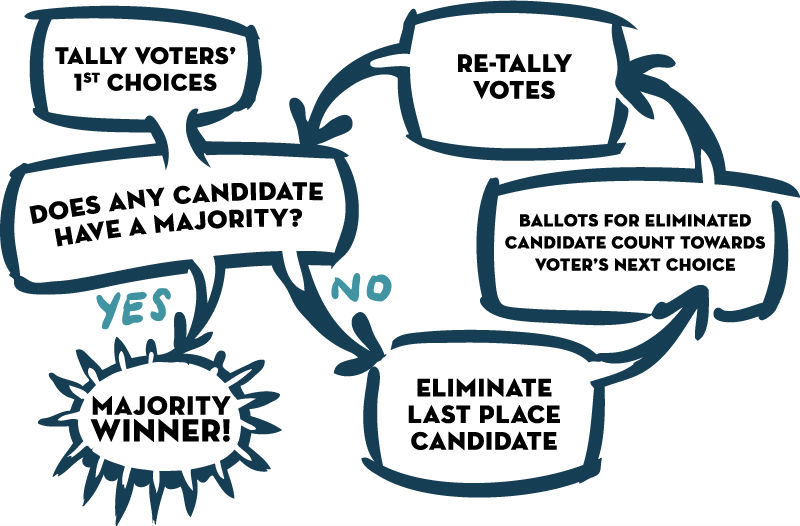Hoboken could be among first municipalities in New Jersey to adopt ranked choice voting
FBW | September 22, 2019
Renee Steinhagen, the Executive Director of New Jersey Appleseed Public Interest Law Center, explained that in the United States, the abolition of slavery, women’s suffrage, the direct election of U.S. senators and a number of other transformational changes came about not through the major political parties but through minor ones. Yet our two-party system makes it difficult for third parties to build support and have a voice, especially in New Jersey.
In Hoboken, run-off elections were eliminated in 2012. In November 2017, with seven candidates running for mayor, Ravi Bhalla won with just 33% of the vote. Scott Siebel, the Director of Outreach for FairVote, pointed out that the democratic principle of “majority rules” does not always apply to the United States and cited a number of examples in our national elections.
In 2016, Donald Trump prevailed with 46 percent of the popular vote and in 2000, George W. Bush won with 47.9 percent of the popular vote. In 1992, Bill Clinton became president with just 43 percent. In 2016, Donald Trump and in 2000, George W. Bush were elected president despite losing the popular vote thus exposing an even greater flaw in our democratic election process.
But run-off elections present many problems. There is the cost of holding another election, candidates with larger war chests have an unfair advantage, and invariably run-off elections result in greatly diminished voter turn-out.
People showing up for the forum on the night of September 17 at the Hoboken Public Library recognized the need for election reform. The forum was convened by Hoboken Councilwoman Emily Jabbour. In addition to Ms. Steinhagen and Mr. Siebel, Assemblywoman Annette Chapparo also spoke. She is one of the sponsors of Assembly Bill 1801 that would allow municipalities that hold nonpartisan elections to adopt instant run-off (IRV), also known as ranked choice voting.
All of the speakers pointed out the many advantages that this system would provide. First, it would allow candidates to be elected through majority vote. With ranked choice voting, voters select their first, second, third and other choices, depending on the number of people running. If no candidate receives more than 50 percent after tallying the first choice votes, candidates finishing last are eliminated with their voter’s second, third or other choices being transferred to the remaining candidates. This process is repeated until a candidate finally obtains a majority vote.
This system discourages negative campaigning since candidates must reach out to as many voters as possible including the ones supporting their opponents. It also encourages more choices for voters and eliminates “spoiler” candidates running to draw away votes from competing candidates.
Over the past two decades, communities across the country have been adopting ranked choice for certain elections including Berkeley, Oakland, San Francisco and San Leandro in California; Basalt and Telluride, Colorado; Portland, Maine; Takoma Park, Maryland; Cambridge, Massachusetts; Minneapolis and St. Paul, Minnesota; Santa Fe, New Mexico; Hendersonville, North Carolina; and Memphis, Tennessee. In 2016, the state of Maine adopted ranked choice voting for all state and federal primary elections. This November, New York City voters will have an opportunity to approve ranked choice voting for all city offices in primary and special elections.
Ms. Steinhagen came to Tuesday’s forum with a list of New Jersey municipalities that operate nonpartisan elections. She said this should provide a roadmap to build support for Assembly Bill 1801. Her idea is to enact instant runoff ordinances through the initiative process that would only go into effect when the state law is adopted (i.e., instant runoff “trigger” ordinances) Ms. Steinhagen has been pushing ranked choice voting as well as a number of other election reform issues in New Jersey since she became Executive Director of New Jersey Appleseed in 1998. She has played an active role with Hoboken groups that have taken up a number of public interest initiative petitions.
Hoboken voters have had much success utilizing New Jersey’s right to initiatives and referendums for good causes. The Coalition for a Better Waterfront (the precursor to Fund for a Better Waterfront) defeated the City’s agreement with the Port Authority of New York & New Jersey to develop the South Waterfront in referendums in 1990 and 1992.
In 2004, a Hoboken advocacy group, People for Open Government (POG), utilizing the initiatives and referendums statute, placed a pay-to-play model ordinance entitled Public Contracting Reform on the ballot. Hoboken voters passed the ordinance by an overwhelming margin. Subsequently, POG successfully pressed the City to pass a developer pay-to-play ordinance under threat of another ballot Initiative petition. For the past fifteen years, these two ordinances have effectively dried up campaign contributions from professional service firms seeking municipal contracts and real estate developers with projects in redevelopment areas.
If Assembly Bill 1801 becomes law, Hoboken would likely become one of the first municipalities in New Jersey to adopt instant runoff or ranked choice voting. There would be tremendous grass-roots support plus political leadership to make this happen.
Related links
Giving New Jersey’s Minor Political Parties a Chance by R. Steinhagen
FairVote
Pending disaster in Hoboken’s upcoming election without majority rule
Citizen initiated ordinances bring an end to pay-to-play campaign cash
Political turmoil and pay-to-play ordinances level the political playing field
POG takes mayor and City to court for campaign finance violations
Major contributions solicited from developers and city contractors
Developers pay to play at Hoboken City Hall by writing big checks


